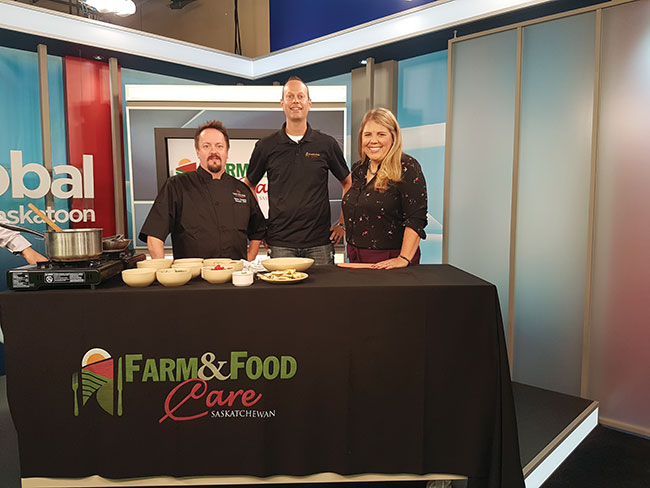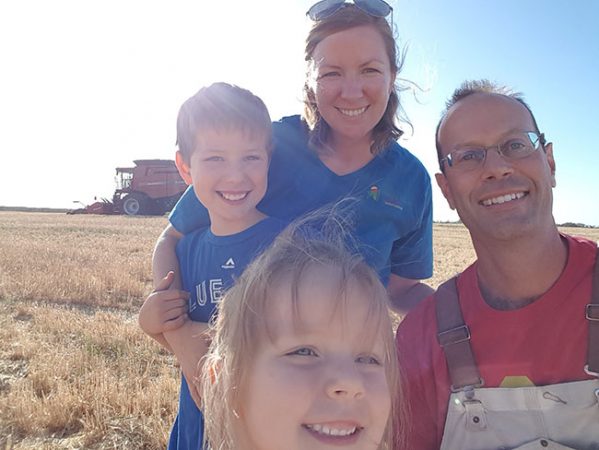
Who’s Who 2020 – Saskatchewan – Clinton Monchuk
By Melanie Epp
Features ProducersNew egg producer a careerlong poultry advocate
 As executive director of Farm & Food Care Saskatchewan, Clinton Monchuk spends much of his time educating consumers about poultry production.
As executive director of Farm & Food Care Saskatchewan, Clinton Monchuk spends much of his time educating consumers about poultry production. While Clinton Monchuk’s entry into Canadian poultry was by no means conventional, today he is one of the sector’s strongest advocates. The Farm & Food Care Saskatchewan (FFC SK) executive director took time out of his busy schedule to talk about the importance of advocacy and how he ended up in poultry.
Monchuk wears several hats. He and his brother farm 3,700 acres in east-central Saskatchewan, where they grow malting barley, canola and wheat, as well as oats, flax, yellow peas and brown and yellow mustard. He’s also one of the province’s newest egg farmers. Monchuk and his brother just started their fourth flock. They’ve had quota since 2016, when they built an aviary, free-run system.
But while he loves farming, he admits he’s more of a minority shareholder. His full-time job is with FFC SK, a role that allows him to bring consumers closer to farming and farmers closer to consumers.
Poultry background
Although Monchuk’s a new egg producer, he’s a poultry veteran. For nearly 10 years he served as CEO of Chicken Farmers of Saskatchewan (CFS). While he might not be the most obvious hire, his credentials were perfect for the role.
At that time, the board was looking for someone who understood government workings. Monchuk had done his undergraduate degree in agricultural economics and a master’s degree in business. Following that, he did an internship in Washington, D.C., where he worked as a lobbyist, and then moved to Ottawa to lobby on behalf of Canadian farmers and ranchers for another three years. He also had experience with supply management, as he grew up on a dairy farm.
Not long after Monchuk took on the role in 2007, there was an avian influenza outbreak in the province. His strengths in management and communication were an immediate asset. “It got me into the fire pretty quick,” he reflects.
University of Saskatchewan poultry extension specialist Tennille Knezacek worked with Monchuk closely during his time at CFS. She says he was instrumental in implementing the new On-Farm Food Safety Assurance Program, as well as managing the avian influenza emergency team in 2007. Knezacek says he also pushed for more industry transparency through social media.
Monchuk, she says, is well suited to his role at FFC SK. “But I miss him in the industry,” she says. “I have nothing but good things to say about Clinton. If he would come back and work for the poultry industry again it would put a huge smile on my face.”
Well-positioned advocate
The combination of his role as a farmer and with FFC SK puts Monchuk in a unique position to reach consumers. Working on-farm keeps him connected with producers, but also helps him to stay relevant when he speaks with consumers.
“Technology changes almost daily,” Monchuk says. “If my only experience with farming was way back in the 80s and 90s, it would be outdated and I wouldn’t be talking current information to consumers.”
Monchuk took on his job at FFC SK in the fall of 2016. Most commodity groups in the province are members of the organization, including egg and chicken producers. Advocacy is the organization’s main task, so helping consumers better understand farming.
Through farm tours, public events and online videos, FFC SK brings consumers closer to the farm. The organization just launched a new initiative called Canadian Food Focus that highlights the nutritional benefits of Canadian agricultural products and helps consumers integrate them into their daily diets.

Monchuk with son Jackson, daughter Katelyn and wife Laura.
Informing consumers
Ultimately, though, FFC SK’s role – and Monchuk’s responsibility within the organization – is about making sure consumers have access to truthful information about farming so they can make informed decisions about the food they eat.
Consumers, Monchuk says, have a lot of questions about how eggs and chicken are produced. Many center around animal welfare, he says.
“For the bulk of the population, they’ve never seen the inside of a barn,” Monchuk says. “The vision that they have and their perception around the poultry industry is going to be from animal rights videos.
“If that’s their only perception of the industry you can imagine what they think happens behind these closed doors,” he adds.
In one of his early encounters, Monchuk remembers meeting a woman who told him she would no longer eat poultry products after learning about how they were treated. Monchuk asked her to expand on her concerns and learned that she had seen an animal right video showing unspeakable animal cruelty.
Rather than immediately defending the industry, Monchuk listened to her. “She had a genuine concern and if we don’t address that concern, it becomes an issue later on,” he says.
What followed was an open conversation about poultry production in Canada and how birds are really treated. “When I gave her that alternate view of what happens in a barn and explained what we’re doing it changed her perspective,” he says.
In fact, at the end of the conversation she was asking where she could buy locally produced eggs and chicken, to which he answered, “Pretty much any grocery store.”
Handling tough questions
Other areas of concern for consumers include antibiotics, hormones and genetic modification. Many have questions about the different types of housing systems and what they mean. Monchuk says he’s open about the pros and cons of each, taking special care not to pit one as better than the other.
“Advocacy has to exist,” Monchuk says. “I do that because I work for Farm & Food Care, but also because I’m a farmer. I think that the more farmers and ranchers that do this in our country, the more informed the population will be.”
Some of the questions are tough, and while one might be inclined to avoid answering them, Monchuk says producers should try. While viewing these concerns through farmers’ eyes is understandable, producers should try viewing them from the consumer’s perspective.
“If we don’t speak up about what we’re doing then that negative view persists,” he says. “What has to come across is showing that you care. I’ve never met a farmer or a rancher who doesn’t care about their animals or their crop or their land. They care about it because it’s their livelihood. In a lot of instances, people don’t realize that.”
At the end of the day, it’s Monchuk’s passion for people and agriculture that drives his advocacy work. “I love talking to people,” he says. “I enjoy talking about farming and I enjoy talking, so I think this position is made for me. I really enjoy it.”
Print this page